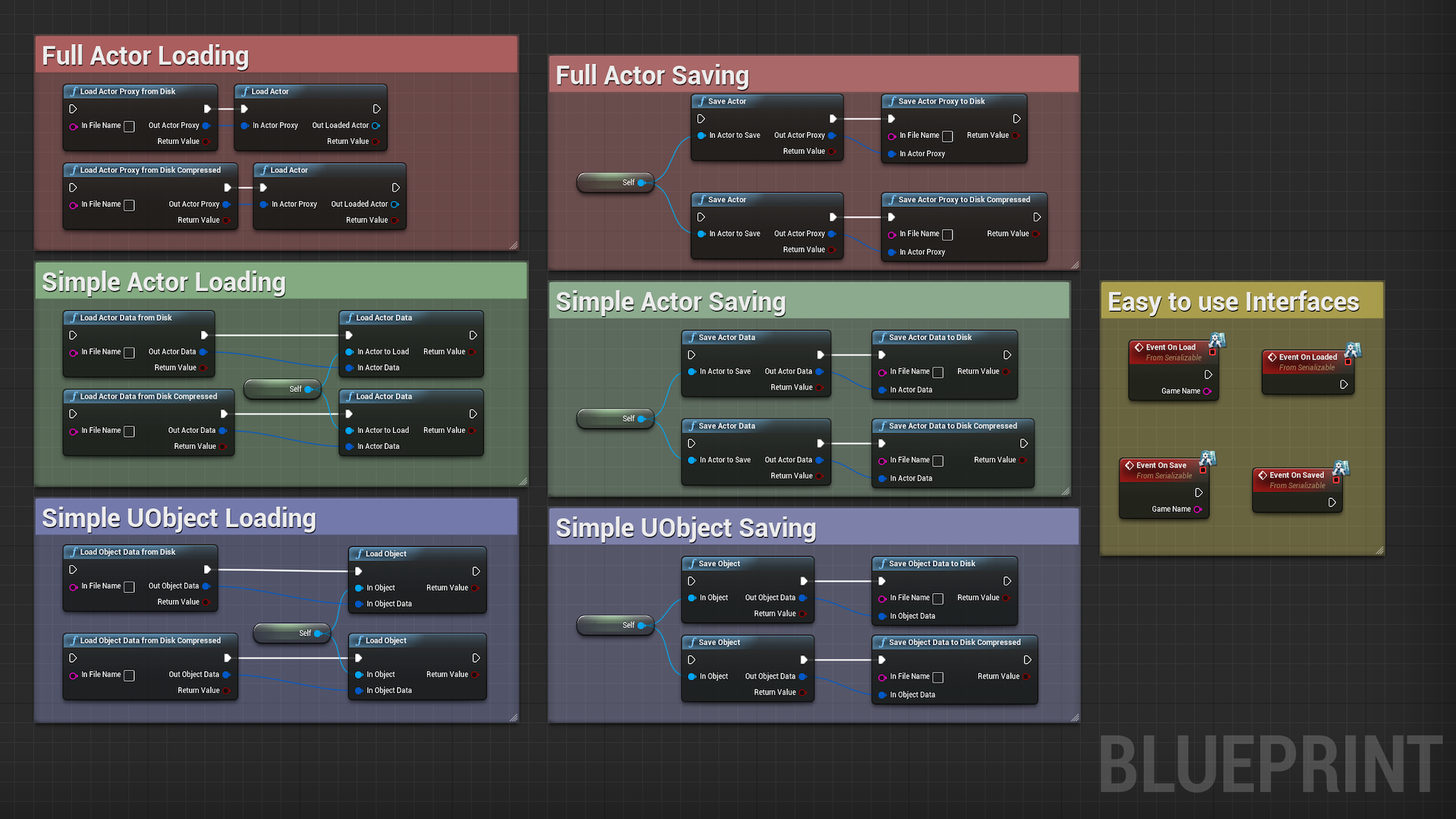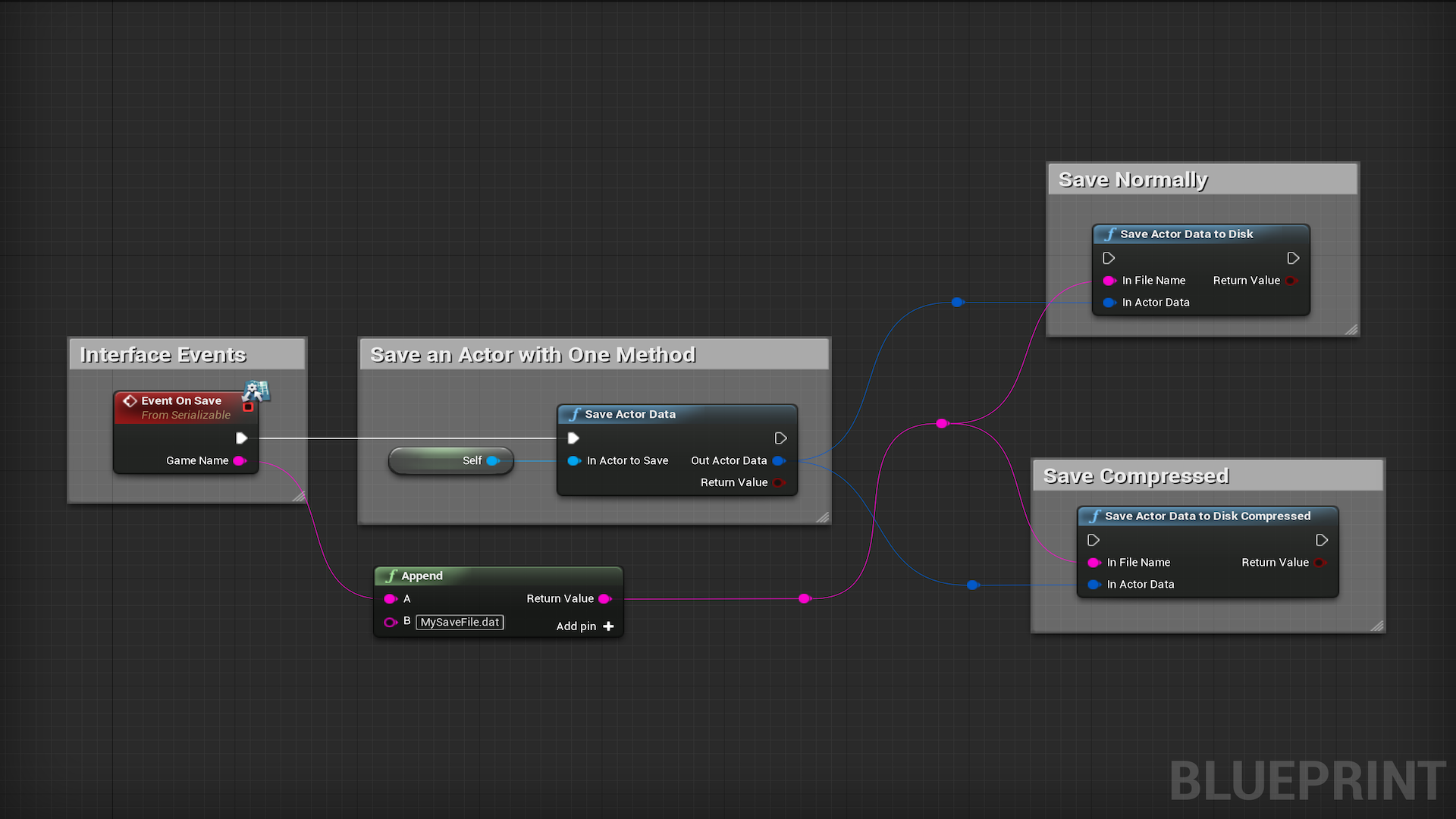This plugin is currently used in the unreleased game Beyond Binary by Numbskull Studios. The plugin was created because Unreal's SaveGame system didn't meet the requirments for Beyond Binary.
The majority of code sits inside the NumbskullSerializationBPLibrary file with simple methods like SaveActor and SaveActorProxyToDisk.
Warning: This plugin does not try to solve file/path/game management. Saving and loading methods expect full file paths so the user must properly supply these.
In Beyond Binary, the game instance collects all objects with the Serializable interface and passes the game name ("Game 1", for example).
The interface objects then use methods in a GamePaths object to convert game names into paths ("/path/to/project/folder/Saved/Games/Game 1/").
Each method in the library returns a bool to indicate success or failure. More logging will be added to help with debugging.
The library includes three main object types for storing data from an object or actor:
- Actor Data (Holds serialized data and the actor's transform)
- Actor Proxy (Holds serialized data as well as class, name and transform)
- Object Data (Holds only serialized data)
Methods like SaveActor, SaveActorData and SaveObjectData will return these storage types.
These storage types can be easily saved with SaveActorProxyToDisk, SaveActorDataToDisk and SaveObjectDataToDisk.
- Include
NumbskullSerializationBPLibrary.h - Include
Serializable.h - Add the
ISerializableinterface to your class - Declare in the header
virtual void OnSave_Implementation(const FString& GameName) override;
virtual void OnLoad_Implementation(const FString& GameName) override;
- Save
thisobject with
FObjectData ObjectData;
UNumbskullSerializationBPLibrary::SaveObject(this, ObjectData);
UNumbskullSerializationBPLibrary::SaveObjectDataToDisk(GameName + TEXT("MyFile.dat"), ObjectData);
- Load
thisobject with
FObjectData ObjectData;
UNumbskullSerializationBPLibrary::LoadObjectDataFromDisk(GameName + TEXT("MyFile.dat"), ObjectData);
UNumbskullSerializationBPLibrary::LoadObject(this, ObjectData);
- Include
NumbskullSerializationBPLibrary.h - Include
Serializable.h - Add the
ISerializableinterface to your class - Declare in the header
virtual void OnSave_Implementation(const FString& GameName) override;
virtual void OnLoad_Implementation(const FString& GameName) override;
- Save
thisactor with
FObjectData ObjectData;
UNumbskullSerializationBPLibrary::SaveActorData(this, ObjectData);
UNumbskullSerializationBPLibrary::SaveActorDataToDisk(GameName + TEXT("MyFile.dat"), ObjectData);
- Load
thisactor with
FObjectData ObjectData;
UNumbskullSerializationBPLibrary::LoadActorDataFromDisk(GameName + TEXT("MyFile.dat"), ObjectData);
UNumbskullSerializationBPLibrary::LoadActorData(this, ObjectData);
ActorProxiess save the entirety of an actor so it can be respawned during loading.
The intended use is for dynamically spawned enemies or equipment on the player like a sword.
It's best practice for an object like the GameMode to save and load these objects as, while a dynamically created object can save itself, they can't load themselves as they won't exist on new level loads.
- Include
NumbskullSerializationBPLibrary.h - Include
Serializable.h - Add the
ISerializableinterface to your class - Declare in the header
virtual void OnSave_Implementation(const FString& GameName) override;
virtual void OnLoad_Implementation(const FString& GameName) override;
- Save a dynamically created actor with
AActor* ActorToSave;
FActorProxy ActorProxy;
UNumbskullSerializationBPLibrary::SaveActor(ActorToSave, ActorProxy);
UNumbskullSerializationBPLibrary::SaveActorProxyToDisk(GameName + TEXT("Actor.dat"), ActorProxy);
- Load the dynamically created actor
AActor* ActorToLoad = nullptr;
FActorProxy ActorProxy;
UNumbskullSerializationBPLibrary::LoadActorDataFromDisk(GameName + TEXT("Actor.dat"), ActorProxy);
UNumbskullSerializationBPLibrary::LoadActor(GetWorld(), ActorProxy, ActorToLoad);
ActorToLoad->AnyMethodAsTheActorIsLoaded();
MyActor.h
#include "NumbskullSerializationBPLibrary.h"
#include "Serializable.h"
class AMyActor : AActor, ISerializable
{
virtual void OnSave_Implementation(const FString& GameName) override;
virtual void OnLoad_Implementation(const FString& GameName) override;
};
MyActor.cpp
#include "MyActor.h"
void AMyActor::OnSave_Implementation(const FString& GameName)
{
FString FileName = GameName + TEXT("MyActor.dat");
FActorData ActorData;
UNumbskullSerializationBPLibrary::SaveActorData(this, ActorData);
UNumbskullSerializationBPLibrary::SaveObjectDataToDiskCompressed(FileName, ActorData);
}
void AMyActor::OnLoad_Implementation(const FString& GameName)
{
FString FileName = GameName + TEXT("MyActor.dat");
FActorData ActorData;
UNumbskullSerializationBPLibrary::LoadObjectDataFromDiskCompressed(FileName, ActorData);
UNumbskullSerializationBPLibrary::LoadObject(this, ActorData);
}
The library also includes a PostLoadListener. This interface allows an object to take action after its Serialize method is called. Intended for when you want to make sure all data has been loaded before proceeding.
In Beyond Binary, the method is used to wait until a robot's appearance has been loaded. Once we have the specific limbs, we can update the visuals. Doing this in BeginPlay would result in a "prefab" looking robot.
Finally, the library includes a NewGameListener. The interface allows objects to react to a new game. An example could be giving the player default equipment.

